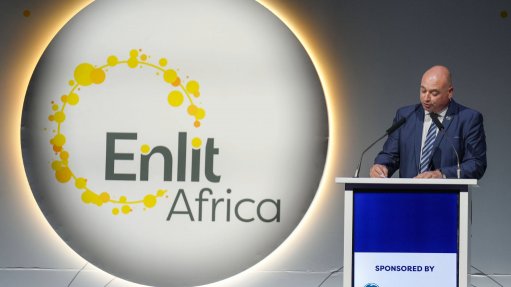
TAKING TO THE FUTURE This years Enlit Africa theme – Less Talk, More Action – aims to encourage attendees and speakers to move away from talk in favour of action and implementatio
With ballooning foot traffic, demonstrated by an increase in attendance of 81% from 2022 to 2023, the organisers of this year’s Enlit Africa anticipate a “bumper event that will be attended by global dignitaries and industry leaders”.
The Enlit Africa 2024 will be held at the Cape Town International Convention Centre from May 21 to 23.
“We anticipate more than 7 500 people at Enlit Africa this year, with representatives from Egypt, Ethiopia, Angola, Ghana, Uganda, Nigeria, CÔte d’Ivoire and other countries attending,” enthuses Enlit Africa event director Chanelle Hingston.
She adds that the theme for this year’s event – Less Talk, More Action – aims to encourage attendees and speakers to move away from talk in favour of action and implementation.
“In some cases, we have been speaking about the same challenges for two or more decades. It is, therefore, important that we start holding stakeholders accountable and demanding action that is going to make a difference for the 600-million people across Africa who still do not have access to reliable energy supply.
“That is the only way we can ensure that the energy transition is not only sustainable, but ‘just’ as well.”
Hingston emphasises that the pan-African energy conversation focuses on driving action to ensure every country on the continent benefits from a sustainable energy and water transition, in line with local conditions.
The event brings together prominent decision-makers, thought leaders and industry experts to discuss topics such as financing and gas-to-power (GtP) solutions.
Some of the key names expected at this year’s event include Minister of Mineral Resources and Energy Gwede Mantashe, Deputy Minister of Mineral Resources and Energy Nobuhle Pamela Nkabane, State-owned power utility Eskom Group CE Dan Marokane, Eskom CFO Calib Cassim and Department of Mineral Resources and Energy director-general Jacob Mbele, while multinationals and experts such as Siemens, GE Vernova, the Environmental Defence Fund, Power Africa and others, will also attend, she says.
Introducing New Energy
The organisers are pleased to introduce an additional element – pitch sessions – for projects that aim to unlock financing for further development.
“We have 15 projects that will be showcased on May 22 during the Renewable Energy and Storage Programme, and this is open not only to financiers but also anyone interested in finding out what is happening from a projects perspective,” adds Hingston.
Given the early indications of “overwhelming interest”, the Women in Energy event – powered by networking and industry event organiser VUKA Group’s WomenIN portfolio – has been expanded and promises to be an “unforgettable experience”.
Its theme, ‘Supporting Women in Renewable Energy – A Grassroots Approach’, highlights the sector’s commitment to real, actionable steps for empowering women in the sector, she adds.
Attendees can expect insightful discussions, success stories, and strategies for fostering a gender inclusive renewable-energy landscape.
Demand Permutations
The African energy transition faces significant legacy hurdles that impede swift radical transformation, and “it is time to empower African countries to make their own choices around energy and their future”, states Hingston.
The Enlit Africa agenda drives home the sector’s commitment to taking action with a keynote focusing on a framework designed to determine how easily a country could make its energy transition, based on the infrastructure, policies and projects it currently has in place.
“Further discussions include the role of GtP and its value to Africa – a contentious discussion that has complex roots and repercussions,” she adds.
Also, the multifaceted world of financing in Africa’s power and water sectors – spanning discussions about bankable projects, bridging the financing gap and keeping finance local – will be addressed.
“In considering Africa’s energy future, it is essential to ensure that decisions are guided by a collaborative effort that respects the unique perspectives of the various countries’ industry experts and the individual needs of countries on the continent,” she says.
Additionally, it is imperative to prioritise African voices and innovations in addressing the challenges of climate change, the promotion of renewable energy and the complexities surrounding GtP initiatives.
“By empowering Africa and incorporating its insights, the energy transition can be more effectively and sustainably managed,” Hingston concludes.